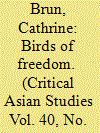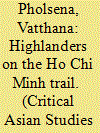|
|
|
Sort Order |
|
|
|
Items / Page
|
|
|
|
|
|
|
| Srl | Item |
| 1 |
ID:
084449


|
|
|
|
|
| Publication |
2008.
|
| Summary/Abstract |
The article explores how the dominant discourses of identity politics in the Sri Lankan conflict have silenced people in northern Sri Lanka and closed spaces for political participation. In order to understand the discursive processes and their material outcomes, the article addresses in particular the role of young people in northern Sri Lanka and explores their relationship to the Liberation Tigers of Tamil Eelam (LTTE). The author examines the LTTE's discourse on gender, young people, nationalism, and governance through the lens of two books written separately by Anthon Balasingham and by Adele Balasingham. Birds of Freedom, the LTTE's women's wing, is shown to be an example of how the warring parties have monopolized liberation discourse through the uncompromised nationalism of a militant movement. The article discusses how this dominant discourse informs young people's lived experiences, material realities, and life opportunities for participation as social actors in their communities in the Jaffna peninsula. A particular feature of people's everyday lives in northern Sri Lanka is described as a complex citizenship characterized by the presence of several governing and uncompromising actors to whom people must relate. The latter part of the article analyzes the way young people in the north of Sri Lanka relate to this context of complex citizenship, with particular reference to the LTTE.
|
|
|
|
|
|
|
|
|
|
|
|
|
|
|
|
| 2 |
ID:
084446


|
|
|
|
|
| Publication |
2008.
|
| Summary/Abstract |
In the late 1980s and into the 1990s, South Korean social movements converted a former military dictatorship into a more democratic regime, while raising hopes for yet more improvements in the position of Korean workers and farmers. In the 1990s, Thai social movements also cast aside a military dictatorship and opened a period in which popular movements seemed poised to make yet greater gains. Yet as of 2008 it is apparent that social movements in both South Korea and Thailand have faced increased difficulties and have seen a number of significant setbacks. The authors of this article analyze what they take to be one of the reasons for these setbacks: the failure of social movements in both of these countries to more successfully internationalize their efforts. Failed internationalism is far from being the only significant factor in this social movement decline, and, moreover, it has not necessarily occurred in precisely the same way in the South Korean and Thai cases. The authors show, however, that by analyzing similarities and differences in the patterns of social movement decline between South Korea and Thailand one can discern some common conundrums faced quite generally by social movements in an era of neoliberalism and neoconservatism.
|
|
|
|
|
|
|
|
|
|
|
|
|
|
|
|
| 3 |
ID:
084452


|
|
|
|
|
| Publication |
2008.
|
| Summary/Abstract |
The history of the hinterlands of the Indochinese peninsula, astride the frontier between Laos and Vietnam, during the first and second Indochina wars (1946-75) is arguably the least informed of this turbulent period. The aftermath of World War II saw the establishment of revolutionary bases at the junction between southeastern Laos and central and southern central Vietnam in highly strategic areas that were conduits for the "Ho Chi Minh Trail." This article aims to go beyond conventional diplomatic and military histories of the Indochina wars to examine war from below. In particular, the second half of the article is constructed around the narratives of two female war veterans of ethnic minority origins who conducted most of their revolutionary activities during the Vietnam War along the Ho Chi Minh Trail. Particular attention is given to their motivations and wartime lives, linked to their transformation from members of upland populations who not long ago were described as "savages" into "revolutionaries" and "patriots."
|
|
|
|
|
|
|
|
|
|
|
|
|
|
|
|
| 4 |
ID:
084447


|
|
|
|
|
| Publication |
2008.
|
| Summary/Abstract |
Discussions of resource management and development in northern Thailand often emphasize the threat of eviction faced by uplanders living in forest reserve zones. This "specter of eviction" is to be found in official government policy, in academic accounts of highland development, and in the activist writings of nongovernmental organizations (NGOs). The review of the literature in this article suggests, however, that very few evictions have in fact taken place since the early 1980s and the threat of eviction in accounts written over the past two decades is exaggerated. The authors examine some of the political, practical, and policy reasons why the rate of eviction has been very low. They conclude by arguing that reliance on the specter of eviction by activist academics and NGOs seeking to defend the rights of upland farmers results in a political strategy that is disempowering and disengaged from current livelihood realities.
|
|
|
|
|
|
|
|
|
|
|
|
|
|
|
|
| 5 |
ID:
084451


|
|
|
|
|
| Publication |
2008.
|
| Summary/Abstract |
On 22 February 2003 a group of foreign residents of Japan gathered in Yokohama's Nishi Ward next to the Katabira River to protest the awarding of a residency certificate (juminhy?) to a seal called Tama-chan. Tama-chan had frequented the river and as such was awarded the certificate because he was "more or less like a fellow resident." The group of foreign residents criticized what they believed to be discrimination by the Japanese state because, whilst a seal is able to gain a residency certificate, foreign residents are legislatively excluded from obtaining one. The Tama-chan protest provides an opportunity for investigating not only the residency registration system, but also other population registries such as the Japanese family registration system and alien registration system. The author of this article argues that a deeper and more informed understanding of the processes of marginalization of foreign residents in Japan can be achieved through a comprehensive investigation of Japan's population registries and their respective histories. The author explains how these population registries are sites of tension in which contained notions of Japanese citizenship and national identity are being contested by foreign resident populations with vested interests in Japan as home, thus revealing the inadequacies, inconsistencies, and ambiguities of these registration systems.
|
|
|
|
|
|
|
|
|
|
|
|
|
|
|
|
|
|
|
|
|